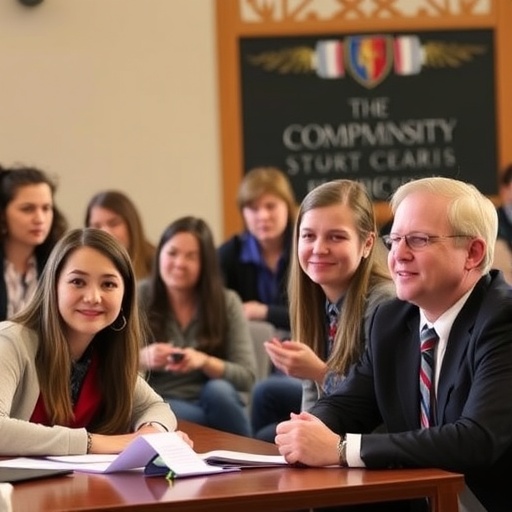The study conducted by Hydinger, Stein, and Wu in their upcoming article published in Pastoral Psychology delves deeply into the perspectives of seminary students regarding their formation strengths and vulnerabilities. Using a mixed-method qualitative approach, the researchers meticulously gathered data to understand the unique experiences and sentiments shared by these students, who are preparing for roles in pastoral care and faith leadership. As the spiritual landscape continues to evolve, the insights obtained from this research provide essential clues about how future leaders perceive their personal and professional development.
In a world where faith-based institutions must navigate contemporary societal challenges, the formation of seminary students becomes more crucial than ever. To explore this, the researchers focused on understanding both the strengths and vulnerabilities that characterize the formation experiences of these future leaders. By leveraging the voices of the students, the study sheds light on the factors that contribute to their resilience and the obstacles that may hinder their spiritual and professional growth. The qualitative approach allowed for rich, narrative data to emerge, illustrating the complex dynamics of theological education.
One of the core findings of the research is the recognition of the unique strengths seminary students possess. Many participants reported feeling a deep sense of purpose and calling in their journey toward ministry. This intrinsic motivation not only fuels their ambition but also serves as a source of resilience against challenges encountered during their studies. As these students grapple with theological concepts and the responsibility of leading faith communities, their strong sense of purpose often provides them with a grounding that helps them navigate the difficulties of their educational journey.
While many students reported positive experiences highlighting their strengths, the study meticulously cataloged the vulnerabilities that accompany seminary formation. Participants voiced concerns about the pressures to conform to traditional expectations and the struggle to balance academic rigor with spiritual formation. This dual burden can lead to feelings of inadequacy and self-doubt, raising questions about the effectiveness of existing educational models. Exploring these vulnerabilities sheds light on the pressing need for institutions to foster supportive environments that validate the emotional and spiritual journeys of their students.
The mixed-method approach facilitated a nuanced understanding of the students’ experiences. Qualitative interviews provided a rich tapestry of personal narratives, while quantitative surveys complemented these narratives with measurable insights. This combination allowed the researchers to triangulate their findings, reinforcing the significance of students’ voices in shaping the educational narrative. The methodology underscores the importance of incorporating multiple perspectives in theological education, paving the way for a more comprehensive understanding of the challenges faced by future leaders.
Furthermore, the study revealed the impact of peer relationships and community on the formation process. Many participants emphasized the importance of building connections with fellow students and faculty members. These relationships not only offered emotional and spiritual support but also fostered a collaborative learning environment where individuals felt empowered to share their vulnerabilities. The presence of a supportive community emerged as a crucial factor in mitigating the stresses associated with seminary education and enhancing overall formation experiences.
Interestingly, the research highlighted the evolving nature of theological education in response to contemporary societal shifts. Issues such as social justice, mental health, and the role of technology in ministry are influencing curricular changes and pedagogical approaches within seminaries. Students expressed a desire for a more holistic education that integrates these relevant topics, emphasizing the necessity for theological institutions to adapt their offerings to prepare students for the complexities of modern ministry.
A key takeaway from the study is the call for seminaries to embrace a more adaptive and inclusive approach to formation. This involves rethinking curriculum design, teaching methodologies, and support services in light of the articulated strengths and vulnerabilities of students. By fostering an educational atmosphere that prioritizes both academic rigor and emotional/spiritual well-being, seminaries can better equip future leaders for the multifaceted challenges they will inevitably face in ministry.
The insights gathered from this qualitative study have broader implications beyond seminary education. As faith communities grapple with the changing landscape of spirituality and belief, understanding the formation experiences of emerging leaders can inform practices that cultivate resilience and effectiveness in ministry. The voices of seminary students serve as a litmus test for the health of theological education and its capacity to prepare leaders who are not only knowledgeable but also highly attuned to the pastoral needs of their communities.
In conclusion, the research conducted by Hydinger et al. serves as a valuable contribution to the discourse surrounding theological education. By amplifying the voices of seminary students, this study provides essential insights into their formation strengths and vulnerabilities. As seminaries look to the future, the findings underscore the importance of fostering supportive environments that nurture personal growth alongside academic achievement. The evolving nature of theological education calls for institutions to reexamine their approaches, ensuring that they remain responsive to the ever-changing demands of ministry in the 21st century.
With such pressing insights, the dialogues sparked by this study will likely influence forthcoming educational strategies within seminaries, rooting their practices in the lived experiences of students. The implications of this research could potentially reverberate through faith communities, touching the lives of congregants, and transforming how ministry is approached in contemporary society.
Subject of Research: Perspectives of seminary students on their formation strengths and vulnerabilities.
Article Title: Seminary Students’ Perspectives on Their Formation Strengths and Vulnerabilities: A Mixed Method Qualitative Study.
Article References:
Hydinger, K., Stein, L., Wu, X. et al. Seminary Students’ Perspectives on Their Formation Strengths and Vulnerabilities: A Mixed Method Qualitative Study.
Pastoral Psychol (2025). https://doi.org/10.1007/s11089-025-01242-2
Image Credits: AI Generated
DOI: 10.1007/s11089-025-01242-2
Keywords: seminary education, formation strengths, vulnerabilities, qualitative research, pastoral psychology.




